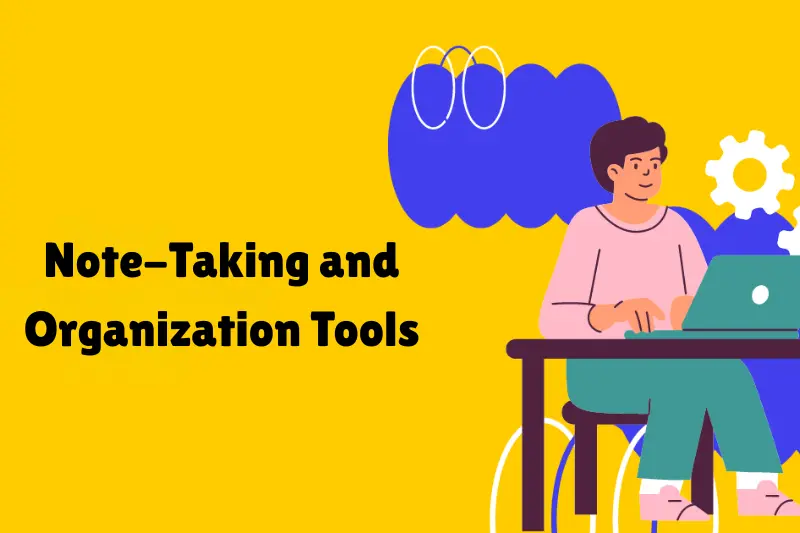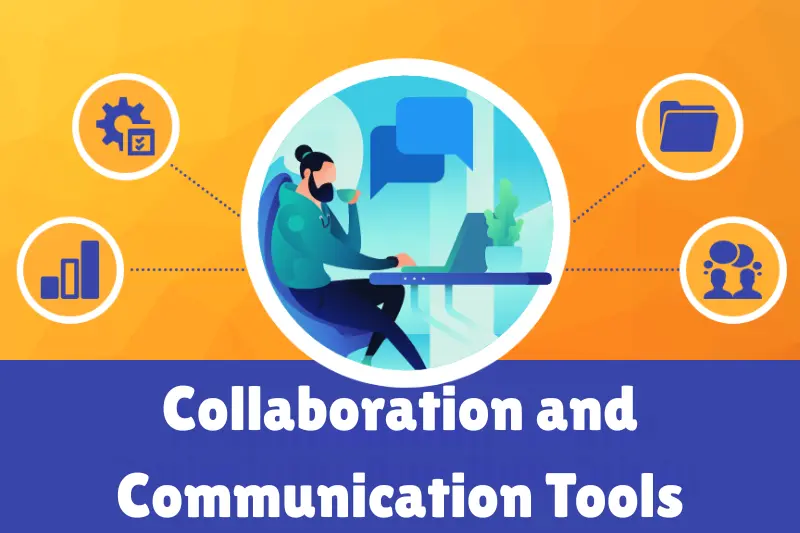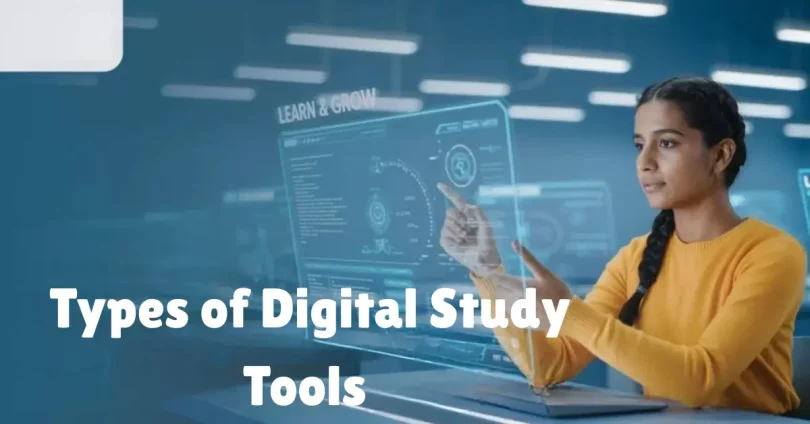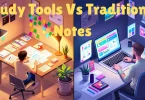In today’s fast-paced learning environment, students are increasingly using technology to study smarter and stay organized. Whether you’re a high school student, university learner, or taking online courses, digital resources can make learning easier and more engaging.
At the core of this trend are the types of digital study tools—from note-taking apps and flashcards to productivity planners and collaborative platforms. For example, Emma, a student in London, uses these tools to organize lectures, track deadlines, and review for exams, making her study routine more efficient and stress-free.
With so many options available, it’s easy to feel overwhelmed. This guide will help you explore the main types of digital study tools, how they work, and how they can transform your learning experience.
1. Note-Taking and Organization Tools

Taking clear, organized notes is the backbone of effective learning. Digital note-taking tools go beyond pen and paper by offering features that help you store, categorize, and retrieve information quickly.
- Evernote: Lets you take notes in text, audio, and image formats. You can also clip web pages or PDFs for later reference.
- Microsoft OneNote: Acts like a digital notebook with sections and pages. Great for organizing subjects, projects, or topics.
- Notion: More than a note app, it’s a flexible workspace that combines notes, tasks, and project planning all in one.
Practical tip: Use tags or folders in these tools to keep your notes organized by topic or exam, making revision much faster.
2. Flashcards and Memory Tools
Memorization is often a challenge, but flashcards and memory apps use scientifically-backed methods like spaced repetition to improve recall. These tools are perfect for learning formulas, vocabulary, or historical dates.
- Quizlet: Create flashcards or practice tests, and use modes like “Learn” or “Match” to make studying interactive.
- Anki: Uses spaced repetition algorithms to present cards just before you are likely to forget, optimizing long-term memory.
- Brainscape: Lets you customize flashcards and track your performance to see where you need extra practice.
Pro tip: Make digital flashcards for topics you struggle with most and review them daily for better retention.
You may also like to read this:
How To Plan Career Growth For Career Development
Why Skill Development Is Important For Careers Growth
Top Career Growth Tips For Professionals Ranked For 2025
Career Growth Vs Career Change: Key Differences Explained
What Are Study Tools? Tips For Effective Learning
3. Learning and Educational Platforms
Digital learning platforms allow you to access structured courses, interactive lessons, and expert instructors—perfect for supplementing classroom studies or exploring new subjects.
- Khan Academy: Free courses covering everything from math to art history, complete with exercises and videos.
- Coursera: Offers professional courses from top universities. You can even earn certifications for career growth.
- Udemy: Thousands of courses in technical skills, creative arts, and personal development.
Tip: Use these platforms to learn at your own pace, revisit challenging topics, or gain extra credits in your field.
4. Productivity and Task Management Tools
Staying on top of assignments, exams, and deadlines is crucial. Productivity tools help you manage time, track tasks, and stay organized.
- Trello: Organize your study schedule visually with boards, lists, and cards for different subjects or projects.
- Asana: Helps plan study projects and track deadlines collaboratively. Perfect for group assignments.
- Todoist: Simple yet effective for daily task management, ensuring you complete assignments on time.
Pro tip: Break down larger projects into smaller tasks in these apps to reduce stress and stay motivated.
5. Collaboration and Communication Tools

Group projects, discussions, and remote study sessions are easier than ever with collaboration tools. They enable seamless communication and resource sharing.
- Google Workspace: Google Docs, Sheets, and Slides allow real-time collaboration on assignments.
- Microsoft Teams: Combines chat, file sharing, and video meetings, making remote teamwork easy.
- Slack: Ideal for academic groups, allowing topic-based discussions and quick resource sharing.
Tip: Use shared folders and channels to keep project files organized and ensure everyone stays updated.
6. Mind Mapping and Visual Learning Tools
For visual learners, mind mapping tools are game-changers. They help organize ideas, illustrate connections, and simplify complex concepts.
- MindMeister: Build interactive mind maps to brainstorm, plan, or revise topics.
- Coggle: Create flowcharts and diagrams collaboratively, ideal for group studies.
- Lucidchart: Perfect for scientific diagrams, engineering concepts, or workflow visualizations.
Pro tip: Convert your lecture notes into mind maps to visualize relationships between ideas, making it easier to recall during exams.
7. Reference and Research Tools
Researching academic work can be time-consuming, but digital reference tools help streamline the process, ensuring accuracy and efficiency.
- Zotero: Manages citations, bibliographies, and research notes for academic writing.
- Mendeley: Organizes research papers, annotations, and collaboration with peers.
- Google Scholar: Provides access to scholarly articles, theses, and books.
Tip: Use these tools to keep your research well-organized and avoid plagiarism while saving time during writing.
8. Additional Tools for Special Needs
Some students require specialized tools to enhance learning:
- Speech-to-Text Apps: Tools like Otter.ai or Dragon NaturallySpeaking convert lectures or notes into text for easier study.
- Accessibility Tools: Tools like Grammarly improve writing clarity, while screen readers support visually impaired learners.
- Language Learning Apps: Duolingo or Babbel are excellent for improving language skills interactively.
9. Time Management and Study Planning Tools
Effective studying isn’t just about what you learn, but also how you manage your time. Digital study tools for planning can help you structure your study sessions, track progress, and ensure you meet deadlines.
- MyStudyLife: A planner app that helps students organize tasks, exams, and lectures.
- Forest: Encourages focus by gamifying time management—plant virtual trees while studying and grow a forest as you stay on task.
- Focus To-Do: Combines Pomodoro timers with task lists to boost concentration and productivity.
Pro tip: Break your study sessions into focused intervals using the Pomodoro technique (25 minutes studying, 5-minute breaks). These tools can keep you accountable and reduce burnout.
10. Exam Preparation and Practice Tools
Practicing past questions, mock tests, and adaptive quizzes can dramatically improve your exam performance. Several digital tools are specifically designed to simulate exam conditions and reinforce learning.
- ExamPrep: Offers practice questions and full-length mock exams for various subjects.
- Topgrade: Lets you create custom quizzes and track your progress over time.
- GoConqr: Combines quizzes, mind maps, and flashcards to strengthen understanding of difficult topics.
Tip: Regularly testing yourself with these apps helps you identify weak areas early, giving you time to focus on improvement before the exam.
11. Interactive and Gamified Learning Tools
Learning doesn’t have to be boring. Gamified digital tools make studying more engaging by turning learning into an interactive experience.
- Kahoot!: A game-based learning platform that lets you create quizzes and compete with classmates.
- Quizizz: Similar to Kahoot!, but you can complete quizzes at your own pace and track scores.
- Duolingo: Uses gamification to make language learning fun with points, levels, and streaks.
Pro tip: Use these tools in small daily sessions to keep learning fun and motivate yourself with measurable progress.
12. Analytics and Progress Tracking Tools
Monitoring your learning progress is essential to understand what works and what doesn’t. Some digital tools provide analytics to help you track performance and optimize study methods.
- GradeScope: Helps track scores and provides detailed feedback on assignments and exams.
- Studysmarter: Monitors learning habits, completion of flashcards, and study goals.
- GoConqr Analytics: Offers insights on which areas need more focus through quiz and mind map tracking.
Tip: Regularly review your progress reports to adjust your study strategy, ensuring you spend more time on challenging topics.
How to Make the Most of Digital Study Tools
Having access to tools is just the first step; using them effectively is what makes the difference. Here are some practical strategies:
- Combine Tools: Don’t rely on just one tool. Use a mix of note-taking apps, flashcards, and productivity tools for a balanced approach.
- Set Realistic Goals: Plan your study sessions using task management apps and set achievable targets each day.
- Consistency is Key: Make digital study tools part of your daily routine to see long-term improvement.
- Stay Focused: Avoid distractions by using apps that limit social media or track your focused study time.
- Review Regularly: Use analytics and flashcard tools to revisit topics frequently and reinforce memory.
Final Thoughts
The variety of types of digital study tools available today is vast, catering to different learning styles and needs. From note-taking and flashcards to productivity, collaboration, and research tools, these resources empower students to study smarter, retain information better, and approach learning in a more organized way.
Whether you’re preparing for exams, completing coursework, or learning something entirely new, there’s a digital tool to support your goals. By exploring and integrating these tools into your daily routine, you can transform the way you learn and make studying more effective, engaging, and even enjoyable.
Start experimenting with these tools today and experience a smarter, more productive approach to learning!
FAQs
1. What are digital study tools?
Answer: Digital study tools are software, apps, or online platforms that help students learn more effectively. They include note-taking apps, flashcards, educational platforms, productivity tools, collaboration tools, and research apps that make studying organized, interactive, and efficient.
2. Why should I use digital study tools?
Answer: Digital study tools can boost productivity, improve understanding, and help you stay organized. They make it easier to memorize information, track progress, collaborate with peers, and access learning resources anytime, anywhere.
3. Can digital study tools replace traditional studying methods?
Answer: Not completely. While digital study tools enhance learning, combining them with traditional methods like reading textbooks, writing notes by hand, and practicing problems often yields the best results.
4. Which digital study tool is best for note-taking?
Answer: Some of the most popular note-taking tools are Evernote, Microsoft OneNote, and Notion. The best choice depends on your preference for organization style, device compatibility, and extra features like audio notes or task management.
5. Are flashcard apps really effective for learning?
Answer: Yes! Apps like Quizlet, Anki, and Brainscape use techniques like spaced repetition to help you remember information long-term, making them highly effective for memorizing vocabulary, formulas, or historical facts.




